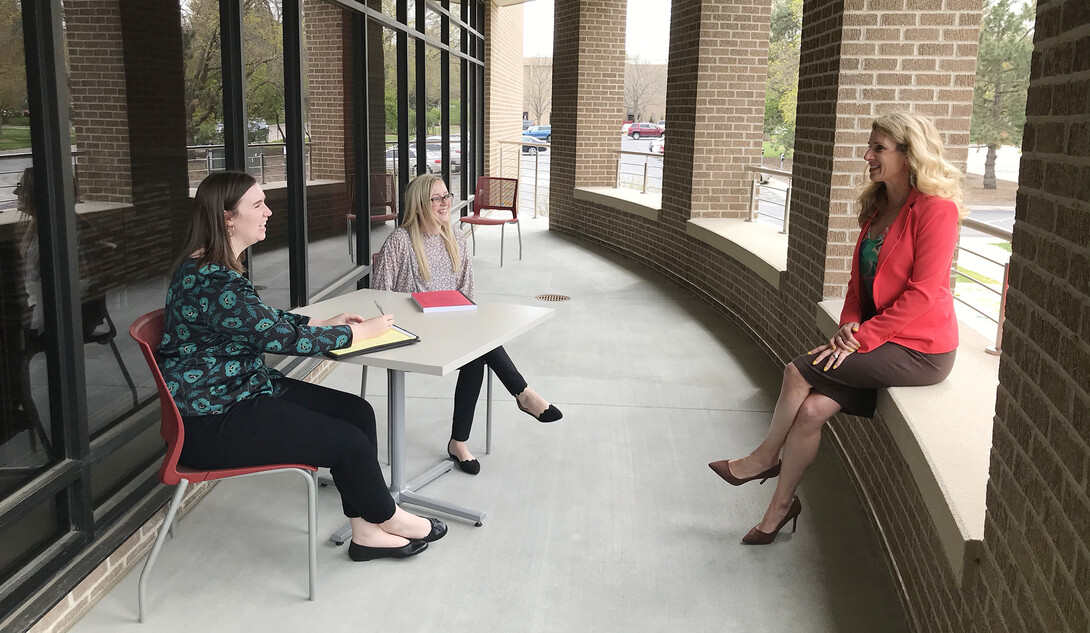
Law students at the University of Nebraska–Lincoln have a unique opportunity to serve the community’s most vulnerable, while getting real-time court experience.
The Children’s Justice Clinic at the College of Law serves abused and neglected children in Lancaster County, and third-year students take on cases as the guardian ad litem.
In Nebraska, the guardian ad litem is the attorney who represents the child in juvenile court, separate from the social worker and county attorney who may be working on the case, too, said Michelle Paxton, director of the clinic.
Since its inception, the clinic has garnered a reputation for high quality advocacy, and as good working partners with community organizations, including the County Attorney’s Office, the Department of Health and Human Services and Legal Aid.
“On any one case, a student attorney will work with a variety of professionals in different capacities, which helps build their skills to work with others and navigate many different personalities and positions,” Paxton said. “We are known for providing high-quality advocacy for our clients.”
About eight students are accepted to be part of the program annually, and then team up into groups of two to work between eight and 12 cases a year. As students work through a case, they conduct an investigation, which involves interviewing all parties involved, getting to know the families they’re working with, and figuring out what the children need and representing those findings in court.
There is no typical situation, Paxton said, but students can expect to spend months on a case. Paxton oversees all of the cases, giving advice and lending her expertise to the students, monitoring them in court hearings and evaluating their work.
Paxton receives referrals for cases and she goes through them to decide which ones would work best for the students, as well as how much the families can benefit from the services offered by the clinic.
Paxton, previously a county attorney with Douglas and Lancaster counties, launched the clinic in 2017 after working with the Center on Children, Families and the Law at Nebraska.
“CCFL provides comprehensive training to all child welfare workers and works to improve systems and outcomes for children and families,” Paxton said. “It was there that I recognized the need for lawyers to receive the same kind of training, through the lens of the law so that they can be better advocates.”

Prior to taking on casework, the students undergo rigorous training, which is a key part of the clinic’s mission to provide high-quality advocacy for children.
“What makes our program unique is it’s a partnership between the College of Law and the Center on Children, Families and the Law (at Nebraska) to ensure that students interested in this type of work receive the training and skills necessary to be high quality advocates for children,” Paxton said. “When you’re representing children, that means understanding the complex circumstances that families are facing when they enter the juvenile system. The partnership with CCFL allows students in the program to receive over 70 hours of expert training on all sorts of matters that are relevant to the work, including substance use, domestic violence, poverty, trauma and child development.”
The trainings continue throughout the semester with weekly sessions on certain topics. The students gain much from the training, beyond what they’ve learned in their law classes to that point.
“Going through law school, you might see things as very black and white, and I think the clinic training does a great job at showing there are shades of gray, and reasons behind why families might find themselves in these particular circumstances, whether it be domestic violence, substance abuse, mental illness or poverty,” Claudia Brock, a May 2021 graduate and clinic attorney, said. “The level of training we receive allows us to address those complexities and think really comprehensively about services we can offer children and assistance to the family as a whole.”
The work is difficult. Working with families going through some of the worst moments of their lives can take an emotional toll. Paxton said the camaraderie among the students and the ability to work on cases in teams helps. She also incorporates Reflective Practice, where students meet and have facilitated conversations about their cases. Paxton said the conversations are meant to acknowledge the thoughts and feelings the students may be having related to their casework. Acknowledging the feelings and working through them helps to ensure the students don’t allow negative emotions to affect their decision-making.
“That gives us a space to talk about some of the struggles that we’re facing and communicate with others in the clinic, who may be experiencing the same things and can give advice,” said Rachel Lowe, a May 2021 graduate and clinic attorney. “That’s been tremendously helpful, but it is hard. There are situations that are very eye-opening, but that’s what makes the Children’s Justice Clinic very rewarding. You get to work with and interact with these families and hopefully advocate for better lives for them.”







